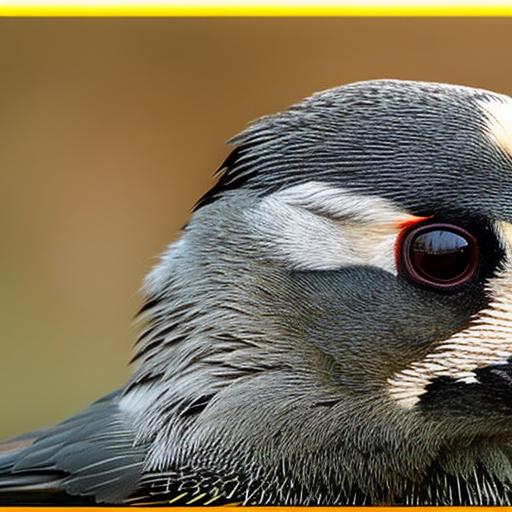Interacting with geese can be a common occurrence, especially in areas where they are known to congregate. However, it is important to understand how to interact with geese in a safe and respectful manner. Geese can be territorial and aggressive, especially during nesting season, so knowing how to avoid confrontations is crucial. By understanding the nature of geese and following some simple guidelines, you can ensure a peaceful coexistence with these beautiful creatures.
Understanding the nature of geese is the first step in learning how to interact with them safely. Geese are social animals that live in flocks and are known for their strong family bonds. They are highly protective of their nests and offspring, which can lead to aggressive behavior if they feel threatened. Geese are also known for their honking and hissing sounds, which they use as a warning signal. It is important to respect their space and avoid any actions that may be perceived as a threat.
Key Takeaways
- Geese are territorial and protective of their young, so it’s important to understand their behavior.
- Avoid areas where geese are known to congregate, such as parks and golf courses.
- Keep a safe distance from geese and avoid making eye contact to prevent them from feeling threatened.
- Move slowly and calmly around geese to avoid startling them.
- Use noise, such as clapping or shouting, to deter geese from approaching.
Understanding the nature of geese
Geese have several characteristics that make them unique and sometimes aggressive. They have a strong sense of territory and will defend it vigorously. Geese are also highly protective of their young, and any perceived threat to their offspring can trigger aggressive behavior. Additionally, geese have excellent eyesight and can detect movement from a distance, making sudden movements around them potentially alarming.
There are several reasons why geese can be aggressive. One reason is their natural instinct to protect their territory and offspring. Geese view any intruder as a potential threat and will act accordingly. Another reason is that geese are highly social animals and rely on their flock for safety and survival. When one goose feels threatened, the entire flock may respond aggressively to protect each other.
Avoiding areas where geese are known to congregate
Geese can be found in various areas such as parks, golf courses, lakes, and ponds. These areas provide them with ample food sources and open spaces for nesting. It is important to be aware of these common areas and take precautions to avoid them if you do not wish to interact with geese.
To avoid areas where geese congregate, it is helpful to research and familiarize yourself with the local geography. Parks and lakes are often popular spots for geese, so it is best to choose alternative routes or locations if you want to avoid them. Additionally, pay attention to signs or warnings posted in certain areas that indicate the presence of geese. These signs are usually put up by local authorities to inform the public about potential risks.
Keeping a safe distance from geese
Keeping a safe distance from geese is essential to avoid any potential conflicts. It is recommended to maintain a distance of at least 30 feet from geese, especially during nesting season when they are more protective and aggressive. By keeping a safe distance, you can observe and appreciate these beautiful creatures without disturbing them.
Determining if you are too close to geese can be done by observing their behavior. If the geese start hissing, honking, or flapping their wings, it is a clear sign that you are too close and should back away slowly. It is important not to approach or try to touch geese, as this can be seen as a threat and may trigger an aggressive response.
Avoiding eye contact with geese
Eye contact can be perceived as a threat by geese, so it is important to avoid making direct eye contact with them. Geese interpret eye contact as a challenge or aggression, which can lead to defensive behavior. By looking away or keeping your gaze lowered when near geese, you can help diffuse any potential tension.
To avoid making eye contact with geese, it is helpful to focus your attention on something else in the environment. Look at the ground or the scenery around you, rather than directly at the geese. This will signal to the geese that you are not a threat and are not interested in engaging with them.
Moving slowly and calmly around geese

Sudden movements can startle geese and trigger their defensive instincts. To avoid alarming geese, it is important to move slowly and calmly when in their presence. This will help them feel more at ease and reduce the likelihood of aggressive behavior.
When moving around geese, it is best to take slow and deliberate steps. Avoid any sudden or jerky movements that may startle them. If you need to change direction or pass by a group of geese, do so gradually and without rushing. By moving in a calm and predictable manner, you can create a sense of safety for both yourself and the geese.
Using noise to deter geese
Noise can be an effective deterrent for geese, as they are sensitive to loud sounds. By making noise, you can discourage geese from approaching or getting too close to you. There are several types of noise that can be used to deter geese.
One type of noise that can deter geese is clapping your hands or using a whistle. The sudden loud sound can startle them and make them retreat. Another option is using a noise-making device such as an air horn or a noisemaker specifically designed for deterring wildlife. These devices emit a loud sound that can be effective in keeping geese at a distance.
Carrying a walking stick or umbrella for protection
Carrying a walking stick or umbrella can provide an added layer of protection when interacting with geese. These objects can be used to create a physical barrier between yourself and the geese, if necessary.
A walking stick or umbrella can be used to gently nudge geese away if they get too close. It is important to note that these objects should be used as a last resort and only if you feel threatened. The goal is to create a safe distance between yourself and the geese, rather than causing harm or aggression.
Wearing protective clothing and gear
Wearing protective clothing and gear can help minimize the risk of injury when interacting with geese. There are several types of protective clothing and gear that can be used.
One option is to wear long pants and long-sleeved shirts to protect your skin from potential bites or scratches. Additionally, wearing sturdy shoes or boots can provide protection for your feet. It is also recommended to wear a hat or cap to protect your head from any potential attacks.
Avoiding feeding geese
Feeding geese may seem like a harmless activity, but it can actually be dangerous for both humans and geese. Feeding geese can encourage them to become dependent on human food sources, which can lead to aggressive behavior and health issues.
When geese become accustomed to being fed by humans, they may start approaching people aggressively in search of food. This can lead to bites or scratches, especially if the geese feel threatened or are not satisfied with the food being offered. It is best to avoid feeding geese altogether and allow them to find their own natural food sources.
Seeking professional help if necessary
In some cases, it may be necessary to seek professional help when dealing with aggressive geese. If you encounter a particularly aggressive goose or a situation that feels unsafe, it is best to contact local authorities or wildlife experts for assistance.
Professional help can be sought from animal control agencies, wildlife rehabilitation centers, or local parks and recreation departments. These organizations have the expertise and resources to handle situations involving aggressive geese and can provide guidance on how to safely interact with them.
Interacting with geese can be a rewarding experience if done in a safe and respectful manner. By understanding the nature of geese and following some simple guidelines, you can ensure a peaceful coexistence with these beautiful creatures. Avoiding areas where geese congregate, keeping a safe distance, avoiding eye contact, moving slowly and calmly, using noise as a deterrent, carrying a walking stick or umbrella for protection, wearing protective clothing and gear, avoiding feeding geese, and seeking professional help if necessary are all important steps to take when interacting with geese. By following these guidelines, you can enjoy the presence of geese while minimizing any potential risks.
If you’re looking for ways to keep geese from attacking you, you might also be interested in learning about the importance of a well-designed chicken coop. A sturdy and secure coop not only protects your chickens from predators but can also help deter geese from entering your property. Check out this informative article on poultrywizard.com that discusses the features of a reliable chicken coop in Muskegon: https://poultrywizard.com/keeping-chickens/chicken-coop-muskegon/. By implementing the right coop design, you can create a safer environment for both your chickens and yourself.
FAQs
What are some common reasons why geese attack humans?
Geese may attack humans if they feel threatened, if they are protecting their nests or young, or if they are used to being fed by humans and become aggressive when food is not provided.
What are some signs that a goose may be about to attack?
Signs that a goose may be about to attack include hissing, flapping wings, lowering their head, and charging towards the person.
What are some ways to prevent geese from attacking?
Ways to prevent geese from attacking include avoiding their nesting areas, not feeding them, keeping a safe distance, and using deterrents such as noise makers or water hoses.
What should you do if a goose does attack?
If a goose does attack, try to protect your face and eyes, and back away slowly. Do not turn your back on the goose or run away, as this may provoke it further.
Are there any legal protections for geese?
In some areas, geese may be protected by law, and it may be illegal to harm or disturb them. It is important to check local regulations before taking any action to deter or remove geese.
Meet Walter, the feathered-friend fanatic of Florida! Nestled in the sunshine state, Walter struts through life with his feathered companions, clucking his way to happiness. With a coop that’s fancier than a five-star hotel, he’s the Don Juan of the chicken world. When he’s not teaching his hens to do the cha-cha, you’ll find him in a heated debate with his prized rooster, Sir Clucks-a-Lot. Walter’s poultry passion is no yolk; he’s the sunny-side-up guy you never knew you needed in your flock of friends!







